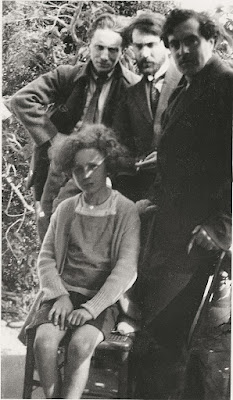THE BANISHMENT
From the director of THE RETURN
THE BANISHMENT (CERT TBC)
(Izgnanie)
A film by AndreY Zvyagintsev
WINNER BEST ACTOR - Konstantin Lavronenko
– Cannes Film Festival 2007
Starring
Konstantin Lavronenko, Alexander Baluev and Maria Bonnevie
In Russian with English subtitles / Russia 2007 / 150 mins
UK RELEASE DATE: 15 August 2008
Opening at selected West End Venues
and selected cinemas nationwide
An Artificial Eye Release
THE BANISHMENT (CERT TBC)
(Izgnanie)
A film by AndreY Zvyagintsev
WINNER BEST ACTOR - Konstantin Lavronenko
– Cannes Film Festival 2007
Starring
Konstantin Lavronenko, Alexander Baluev and Maria Bonnevie
In Russian with English subtitles / Russia 2007 / 150 mins
UK RELEASE DATE: 15 August 2008
Opening at selected West End Venues
and selected cinemas nationwide
An Artificial Eye Release
The Banishment (Based on a short story by William Saroyan entitled ‘The Laughing Matter’) is Russian director Andrey Zvyagintsev’s second feature following his Golden Lion win with The Return in 2003.
This is a tale of pride and patriarchy, which illuminates the dark soul of the Russian male. The rural setting and tragic tale suggest something as earthy and epic as an Emile Zola novel or as majestic Greek tragedy.
Alex (Lavronenko) returns after 12 years to the countryside. Accompanied by his wife Vera (Bonnevie) and their two children, he settles into an old family house. There are fires in the grate, walnut trees in the grounds and it is almost too idyllic to be true.
Alex seems to be a man with a history of violence, drawn from a family pre-disposed to fracture and heartache. His brother Mark (Baluev) no longer sees his children. The great moral dilemma arrives for Alex when Vera informs him that she is pregnant and the child is not his. His word is law and his instincts spark a chain of tragic consequences……
The cinematography by Mikhail Krichman captures the countryside with blistering beauty whilst the brooding score by Andrey Dergatchev and Arvo Part increases the likelihood of comparisons with the films of David Lynch.
All the actors are excellent, but Norwegian-born Ingmar Bergman veteran Maria Bonnevie is superb. She becomes the most compelling human figure in the film.
"In filmmaking, reality is so present that it is difficult to be detached from it. But you have to succeed in doing so to reach another, higher level of reality. When you are directing a film, you have to create a world, and make the invisible visible, which is an exceedingly complex task.
"The Sacrifice is my favourite film. People often ask me if Tarkovsky was an influence on my filmmaking. If his films did have any influence on me, it was not in a conscious way. I also like Antonioni." - Andrey Zvyagintsev
Andrey Zvyagintsev was born in Novosibirsk in 1964. After graduating from theatre school he worked in the theatre. In 1986, he moved to Moscow where he graduated from the acting department of the Moscow State Theatre School . Zvyagintsev then worked as an actor in independent theatre projects and acted in several films. The Return, his feature debut received two Golden Lions at the Venice IFF for Best Film and Best Debut. The film won more than 40 international awards including the European Film Academy Discovery – Prix Fassbinder, the Russian Film Academy Award GOLDEN EAGLE for Best Film and Best Cinematography, a nomination for the HFPA GOLDEN GLOBE in the category of Best Foreign Film, the Swedish Film Institute Award for Best Foreign Language Film, a nomination for a Cesar in the category of Best Foreign Film, a BBC World Cinema Award for Best Foreign Film, and the FIPRESCI Award for Best Foreign Language Film at Palm Springs IFF.
The Banishment (dir Andrei Zvyagintsev 2007 from a novel by William Saroyan)is set in a European anywhere that could be France, the Low Countries or Western Russia, is at once allegorical or mythopoeic blasted inner-city industrial landscape contrasted with an idyllic countryside cottage on a causeway connected to a mainland by a wooden bridge. The built-up mood throughout the film is what matters, rather than the narrative and the characters underscored by the music of the Lithuanian composer, Arvo Part. Arvo Part’s music is lugubrious yet undeniably powerful, as it restrains elements of the music of Bach’s Oratorios into a much more minimal musical landscape, a perfect backdrop to The Banishment. Part’s music appears during a series of epiphanies that are darkly highlighted by glowering weather and seemingly infinite silences, as well as the stark, cobalt blue décor of the farmhouse.
The influence of Bergmann is ever-present (Maria Bonnevie – Vera in the film worked alongside Bergmann, but she is the only non-Russian actor present) in the tormented, spiritually desolate internal landscape that Zvyagintsev delineates. Briefly a man moves his wife and two children from the city to his father’s farmhouse in the hope of better work prospects. While in the country the wife reveals something that threatens to tear the family apart.
Paul Murphy

Comments